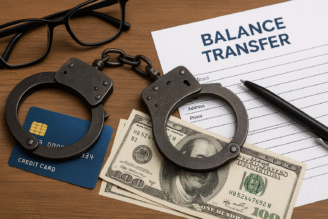Check out 7 tips to avoid credit card debt
Discover practical and simple tips to avoid credit card debt, organize your finances and use your card wisely!
Tips to avoid credit card debt in a simple way

Have you ever felt a chill in your stomach when you open your credit card bill? Well, you’re not alone! In the United States, credit card debt has reached worrying numbers, with many people struggling to get out of the trap.
But here’s the good news: it’s possible to put an end to this situation and avoid accumulating debt quickly. Want to know all the details? Then read on to find out more!
1. understand your finances
First of all, get a piece of paper, an app or a spreadsheet on your computer and write down everything: how much you earn and how much you spend. It sounds basic, but many people avoid this step and end up in the dark about their finances.
Knowing exactly where every dollar is going is the first step to avoiding surprises on your bill. Also, use tools to track spending automatically. It’s super intuitive and helps you organize your expenses in a practical way.
2. Avoid the minimum payment
Ah, the dreaded minimum payment! It may seem like an easy way out, but it’s the fastest way to fall into debt. This is because credit card interest rates are extremely high, often exceeding 20% per year in the USA. If you only pay the minimum, the remaining balance continues to generate interest and becomes a snowball that is difficult to control.
Whenever possible, pay your bill in full. If that’s not feasible, at least try to pay a lot more than the minimum. That already makes a huge difference!
3. Set a realistic budget
Creating a budget is essential if you don’t want to spend more than you earn. This doesn’t mean cutting out all your joys, but prioritizing what’s really important. A good tip is to use the 50/30/20 rule:
- 50% of your income for necessities (rent, food, fixed bills);
- 30% for wants (travel, leisure, shopping);
- 20% for paying off debts or saving.
If the percentage of debts is high, temporarily adjust the other items to focus on paying them off.
4. Avoid using your card unnecessarily
The credit card can be an ally, but also a villain. Always ask yourself before using it: “Do I really need to buy this now?” If the answer is “no”, take a deep breath and leave the purchase for another time.
In addition, giving priority to paying in cash is always a safer choice, especially to avoid unnecessary interest. If it’s hard to resist the impulse, try using a debit card or even cash to give yourself more control.
5. Renegotiate debts
If you’re already in debt, don’t be shy about renegotiating with your bank or card issuer. Many companies offer special conditions for payment, such as reduced interest or more affordable installments.
Another useful resource is the National Foundation for Credit Counseling (NFCC), which offers free or low-cost services to help consumers in the US deal with debt and reorganize their finances.
6. Set card limits
Reducing the available limit on your credit card can be a great strategy for those who find it difficult to control their spending. Call your card issuer and ask them to adjust the limit according to your financial reality. That way, even if temptation strikes, the card won’t allow you to spend more than you planned.
7. Seek financial education
Last but not least: invest in knowledge. Understanding how interest works, the impacts of credit and strategies for saving can completely transform your relationship with money.
There are many free courses and content available online, such as the one offered by the Consumer Financial Protection Bureau (CFPB), which teaches everything from the basics to more advanced personal finance topics.
Conclusion
Avoiding credit card debt doesn’t have to be a nightmare. With organization, healthy habits and conscious use, it’s possible to turn the tables quickly. Start with small changes in your daily life and, little by little, you’ll realize that controlling your finances can be less complicated than it seems.
Now it’s your turn: how about taking the first step today? Organize your spending, download a financial control app and, above all, stick to your goal of avoiding new debts. You can do it!





